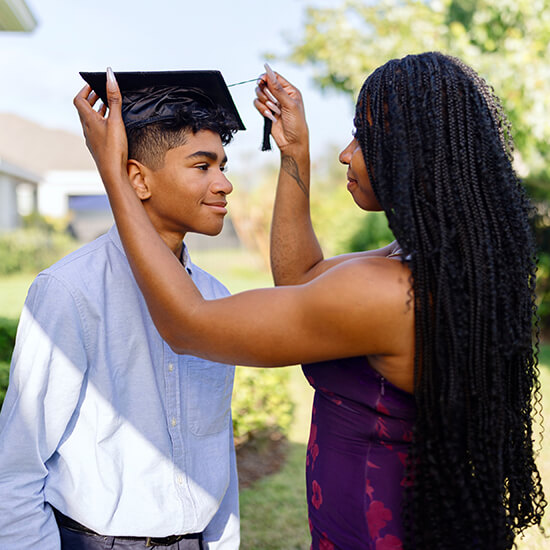

This article is adapted from Ted's podcast episode 341: A Graduate's Gift: Empathy and Predictability
Life transitions can be terrifying. I'll never forget standing at my own high school graduation party, surrounded by well-wishers, feeling like I was staring into an abyss. That moment—that feeling of uncertainty mixed with expectation—was arguably the scariest experience of my life.
And I'm not alone in this. Every year, thousands of young people cross stages in caps and gowns, smiling for photos while internally wondering: "What happens now?"
The Scariest Day of My Life
Let me take you back to 1989. The music was great—New Order, U2, Paula Abdul—and my mullet was magnificently flowing as I rode my moped home after graduation. When I arrived, family members surrounded me with congratulations and the inevitable question: "So, what's next, Teddy?"
The truth? I wanted to study theater. I dreamed of Second City in Chicago and maybe even Saturday Night Live. But I told everyone different stories—business to some, history to others—because I feared their judgment of my actual dreams.
This pressure isn't unique to me. It's universal. Every time I meet someone transitioning through life's stages—eighth grade to high school, high school to college, or any major life shift—I ask: "Are you getting tired of people asking what you're doing next?" Without fail, they all say yes.
The Buffalo Leader Approach to Transitions
Before diving deeper, let me remind you of what it means to be a "Buffalo Leader" in times of transition:
- Charge into storms, not away from them. Accept circumstances with optimism.
- Follow the mission while leading. Be collaborative, resilient, and accountable.
- Remember what you control: your happiness, mindset, and choices.
- Lead with empathy and reflect daily on how you've served others.
These principles aren't just for formal leaders—they're for anyone who influences others, which means all of us.
Two Powerful Memories
Two things happened at my graduation party that shaped my understanding of transitions. First, my Aunt Marsha pulled me aside and said something transformative: "Teddy, no matter what happens, you can always come to me. You can always stay with my house. I will always be here for you."
Aunt Marsha was this cool relative with wanderlust who would work, save money, then quit to travel across the country. As a kid, I admired her adventurous spirit. Now here she was, offering me a soft landing place during my scariest transition.
The second memory was more anxiety-inducing. Some friends picked me up in a red 1970 Ford Mustang to visit other graduation parties. At each stop, I encountered classmates with seemingly perfect plans—medical school, physical therapy programs, clear paths forward that made my uncertainty feel like failure.
But later that night, sitting around a bonfire on Lake Michigan's shore (details of which remain confidential for legal reasons!), someone finally asked: "Are you guys kind of freaking out?" The unanimous answer was yes. One by one, we confessed our true feelings:
"My parents think I'm going to be a physical therapist." "Mine think I'm going to business school, but I want theater." "I don't even like people. I don't want to be a doctor."
That's when I realized: we all need an Aunt Marsha. We all need someone who offers empathy and predictability during life's scariest transitions.
What Graduates Really Need
I recently stumbled upon a poem by Ian Thomas that perfectly captures what graduates experience:
"One day you will wake up and your first thought will not be about all of this."
It's striking because graduates are constantly waking up thinking about their uncertainty. They face relentless questions about their future while feeling immense social pressure to have everything figured out.
So what do they actually need from us? Let me break it down into four powerful gifts:
1. Clear Expectations with Empathy
Pull your graduate aside and ask: "Do you need anything from me to feel successful in this next stage? Is there anything I can do differently to support you?"
Then make things crystal clear:
- "You can always come home."
- "You can always call."
- "I won't be disappointed if you fail."
- "I will only be disappointed if I find out too late to support you."
Remember this profound truth: The way you talk to your children becomes their inner voice. The same applies to anyone you mentor or support. Make sure your voice in their head is supportive, clear, and loving.
2. Sheet Cake Moments
We need to celebrate effort, not just achievement. When someone accomplishes something remarkable or works hard toward a goal—even if they don't quite reach it—show them you see their effort.
These "sheet cake moments" recognize the journey, not just the destination. They communicate: "I see how hard you worked. I notice your growth. Your effort matters."
3. Simple Expressions of Love
This might sound basic, but it's profoundly important. Pull your graduate aside from all the chaos, look them in the eye, and simply say, "I love you." Then give them a hug.
This simplicity creates a foundation of security. It communicates that your love isn't conditional on their success or achievements. It gives them the emotional safety net they need to take risks and face the unknown.
4. Positive Reinforcement
Around age 9 or 10, we often stop positively reinforcing children's behavior. They can handle basic life tasks, so we shift to pointing out flaws rather than celebrating strengths.
But everyone—from middle schoolers to college graduates—needs to hear they're doing well. Not just about their achievements, but about who they are:
- "I see how kind you are."
- "I notice how conscientious you've become."
- "I appreciate how you support your family."
- "I value the way you're a good friend to others."
This reinforcement moves graduates from anxiety to stability by showing them where they stand.
The Greatest Graduation Gift
The most meaningful gift you can give isn't monetary. It's a simple note with four elements:
- Clear expectations: "I'm your uncle/aunt/friend. I'm your ride-or-die. Call me when you need anything."
- Recognition of effort: "I saw how hard you worked. Here are three specific examples..."
- Love: Write it big, highlight it, draw hearts around it—make it unmistakable.
- Positive reinforcement: "I'm proud that you did this. I appreciate that you did that."
This note costs nothing but means everything. The savings bond will be lost, the candle will be burned and tossed (thank you very much, Loyola University of Chicago), but this message will be cherished because it provides what graduates truly need: empathy and predictability.
Beyond Graduation Day
Here's a final strategy that can transform a graduate's experience. After the celebrations end and normal life resumes, many feel a letdown. The energy dissipates, and they're left wondering if anything has changed.
Combat this with what I call "overheard compliments." My wife Megan and I used this technique with our children. We'd position ourselves on different floors of the house and have loud conversations about how proud we were of something our kids had done:
"Meg, I heard from a teacher that Gracie helped her sick friend Abby today." "Of course she did—she's always so helpful!"
Later, Gracie would casually mention helping Abby, letting us know she'd overheard the praise.
For graduates, adapt this by sending weekly or monthly notes:
"Dear [Name], I heard that you [something amazing they did]. I'm proud of you. Remember, I'm your Uncle Ride-or-Die. Love, [Your name]"
There's nothing more powerful than receiving a handwritten card in the mail. In dorms, barracks, or workplaces, these cards become anchors—pinned to bulletin boards or kept in books. When anxiety hits, graduates return to these tangible reminders that someone believes in them.
Smart Thinking Challenge
As we wrap up, I challenge you to do some smart thinking:
- List the people in your life who are graduating or transitioning and could benefit from this approach.
- Reflect on the scariest transition you've faced. What did you need to get through it?
- Identify the people who brought you joy, warm breezes, or sunshine when you were scared.
Remember, the greatest gift you can give someone facing life's uncertainties isn't material. It's the priceless combination of empathy and predictability. It's saying, "I see you, I believe in you, and I'll be here for you—no matter what."
When we offer this gift, we help others charge confidently into whatever storms lie ahead, knowing they have someone they can count on behind them.
And isn't that what we all needed at our own graduation parties, standing on the edge of the unknown, smiling for photos while our hearts raced with fear?

Ted Neitzke is a lifetime educator and has served at high levels of leadership in schools in the United States. Ted is known for his work with employee engagement, strategic planning, and solutions for the workplace. His focus on collaboration and process have allowed for others to find success. Ted is a nationally recognized motivational speaker and works with organizations to support their success. His leadership has supported international recognition in employee engagement, regional recognition in strategic excellence, and local recognition for service and non-profit support. Ted is the creator and host of The Smart Thinking Podcast; a weekly podcast filled with stories and processes to support leadership everywhere.

Comments